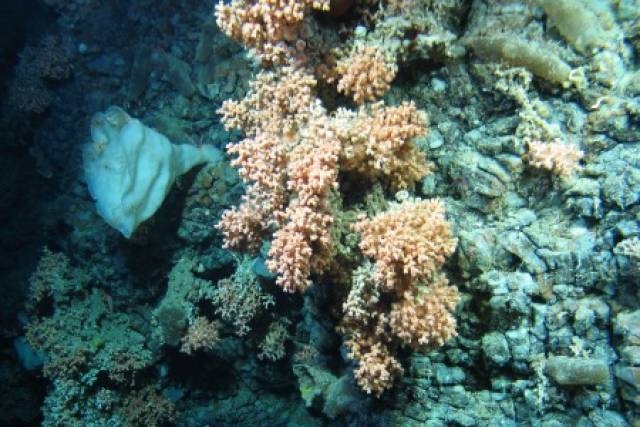#MarineScience - A team of scientists have discovered the deepest known occurrence of a cold water coral reef known as Solenosmilia variabilis in Irish waters.
The marine scientists, led by the Marine Institute with the National Parks and Wildlife Service (NPWS), travelled over 1,000 nautical miles over three weeks along Ireland's Porcupine Bank and continental slope collecting HD video, sample cores and biological specimens from marine wildlife along the shelf edge from 50 locations.
They also explored the Atlantic Ocean to depths of more than 1,600 metres as part of a multi-agency and university collaboration using video mapping with the Marine Institute’s mini-submarine ROV Holland I.
The SeaRover survey was carried out on the Commissioner of Irish Lights vessel ILV Granuaile, gathering data for marine planning, habitat protection and measuring the effects of climate change.
“Some of the reef ecosystems and habitats we discovered have never been seen before, and discovering S. variabilis at depths greater than 1,600m helps us establish a better understanding of the environmental conditions necessary for this species to thrive,” said INFOMAR chief scientist David O’Sullivan.
"The deep-sea coral S. variabilis is widespread, normally seen at depths between 1,000 to 1,300m on seamounts or rocky areas deep under the sea but only occasionally forms reefs.
“Its growth rate is very slow approximately one millimetre per year, so finding the reef structure, which is part of a fragile ecosystem thousands of years old, in deeper parts of the ocean is an important find for marine science.”
Also found in this extreme deep sea environment were sea pens, which visually look like a cross between a feather, a starfish and a fern, but are are actually a form of soft coral.
“With over 300 species currently known around the world, they come in a variety of shapes, sizes and colours — we have seen a wide variety of forms on this survey, and can only give species names to very few as many are likely to be new to science and have yet to be described,” said Dr Yvonne Leahy of the NPWS.
“There are undoubtedly many more unidentified species out there and we ourselves have observed some specimens that require closer examination to properly identify.”
The team used the ROV Holland 1 to map the distribution and extent of deep water reefs and associated habitats, as well as using high-resolution bathymetric maps produced under the national seabed mapping programme INFOMAR, a joint initiative of the Marine Institute and the Geological Survey of Ireland.
The bathymetric data, which shows the depths of the ocean, has been key in identifying specific seabed features such as submarine canyons, escarpments and mounds where reef habitats are likely to occur.
The SeaRover (Sensitive Ecosystem Assessment and ROV Exploration of Reef Habitat) survey is jointly funded by the Government and the EU through the European Maritime Fisheries Fund and NPWS to undertake further mapping surveys of offshore reefs, with the aim of evaluating status and review requirements for conservation and management measures consistent with the Habitats Directive.
The project is co-managed by the INFOMAR programme and Fisheries Science and Ecosystem Services at the Marine Institute and NPWS. While the project objectives are primarily policy driven, the collection of data and scientific benefit will also be of immense benefit to the national and international research community.
The ROV robotic arms were also used to collect biological specimens for NUI Galway's SFI funded project ‘Exploiting and Conserving Deep Sea Genetic Resources’, and will also give new information on where sensitive species are found to help research at University of Plymouth’s Deep Sea Conservation Unit to predict where high value ecological areas might be identified offshore of Ireland and the wider North East Atlantic.
“The biological samples will help us understand the connectivity of different cold-water coral reef habitats, which will ultimately help with their future management,” said on-board senior scientist Dr Kerry Howell from Plymouth University.
This latest research mission comes less than two months after a team of university researchers and students on the RV Celtic Explorer explored cold water corals and sponges in the Whittard Canyon on the south-western edge of the continental shelf.
































































